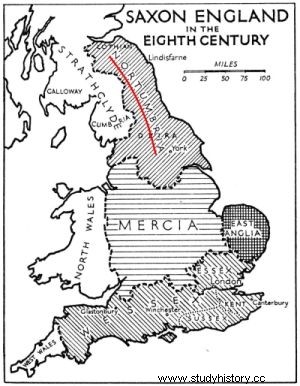Have you ever wondered what the worst job in the Middle Ages was? A rat-catcher, a gravedigger during a plague epidemic, or maybe a torturer's assistant? On my list of the most unlucky professions of this era, I would certainly include ... kings of an Anglo-Saxon state. And in a high place!
First, two sentences of explanation. The title Northumbria is one of the few Anglo-Saxon kingdoms in the early Middle Ages, lying exactly on the border of later England and Scotland. It was established at the beginning of the 7th century, thanks to the "unification" wars led by King Ethelfrith. For the first century, it enjoyed relatively stable, strong rule by monarchs from the same dynasty. However, this situation could not last forever. The royal family branched out into many parts, and other noble families began to sharpen their teeth for the crown.
In the first years of the eighth century, a true merry-go-round of power took off in Northumbria. Of course, we do not know all its details - the sources from such distant times are extremely scarce. I would also not like to bore you with irrelevant details. I will limit myself only to the basic information, neatly listed in the "Kings and Kingdoms of England in the Times of the Anglo-Saxons" by Barbara Yorke, published a few years ago.

Map of the Anglo-Saxon kingdoms in the 8th century.
The trouble seems to have started with Eadwulf, a king of unknown origin who ruled for only a few months (705-706). He was possibly a member of the rival line of the dynasty, but was quickly overthrown by the party of a certain Osred. He ruled much longer, but not without perturbations. First of all, it was the only minor king in England known to sources before AD 900. Probably for a few years he was only a puppet in the hands of the mighty. According to the aforementioned Barbara Yorke, the elevation of the boy to the throne was a desperate attempt to maintain power by a group whose success was dependent on the success of Oswiu's house (i.e. the current dynasty). All adult descendants of the family managed to die in battles and as a result of internal disputes ...
An unprecedented situation was created for the entire century: rulers changed like a kaleidoscope, and none was able to ensure the succession of their descendants .
Osred was murdered "South of the border" in 716, and was succeeded by a distant relative, Cenred. He managed to stay in power for two years and - rather not voluntarily - gave up the throne Osred's brother, Osric. He ruled for 11 years (718-729), but also did not manage to hand over the throne son. The next king was the brother of the removed Cenred, Ceolwulf (729-737).
Are you already getting lost? I hope not, because this is just the beginning. Ceolwulf was overthrown by his rivals, cut by force and sent to a monastery in Lindisfarne, from where he was dragged by his followers to reign for another six years. Then - oh yes - abdicated again and became a monk, apparently of his own free will. Maybe he knew that as a king he was unlikely to live to old age? His cousin Eadbert (737-758) was enthroned.

Lindisfarne Abbey. Most often it was here that the rulers who had been deposed and had their haircut like monks (photo:Russ Hamer, license CC BY-SA 3.0).
Eadbert should probably be called the happiest ruler of 8th-century Northumbria. He also abdicated but only after twenty years. Ba! He even managed to hand over the throne to his son… and that was where his luck ended. Eadbert's son Oswulf was murdered almost immediately .
At that time, new dynasties began to claim the throne, and the origin of the next kings is often impossible to even determine. Ethelwold Moll (758-765) was removed from the throne by Alhred, who in turn was expelled in 774. He was replaced by Ethelwold Moll's son, Ethelred (774-779), but after a few years he was banished . After him, Elfwold sat on the throne - murdered already in 788.

The next king, Osred II (788-790) was the son of the former ruler Alhred. Competitors soon sheared him and banished him . His place was taken by Ethelred, who reigned before then. He must have acted stupidly returning from exile, because after less than six years he was murdered (796). A certain Osbald replaced him for a few months, but he did not even have time to sit down on the throne well. In 796 he was driven out and power passed to Eardwulf. You're probably guessing that he too was banished ? If so, then of course you are right. It happened in 806.
Thus, in a nutshell, we have skipped over the entire eighth century. To be precise, it should also be added that stealthy attacks just as often they reached the king's sons who were candidates for the throne. Many of them were also either chased away or imprisoned in monasteries.
But let's get back to the point. It is hard to imagine a worse occupation than the kingship of Norhumbria in this gloomy age. Or maybe it's just my imagination failing? And what if you know any other, even more lousy medieval profession?
Source:
Trivia is the essence of our website. Short materials devoted to interesting anecdotes, surprising details from the past, strange news from the old press. Reading that will take you no more than 3 minutes, based on single sources. This particular material is based on:
- Barbara Yorke, Kings and kingdoms of England in the time of the Anglo-Saxons , Polish Scientific Publishers PWN, 2009.
